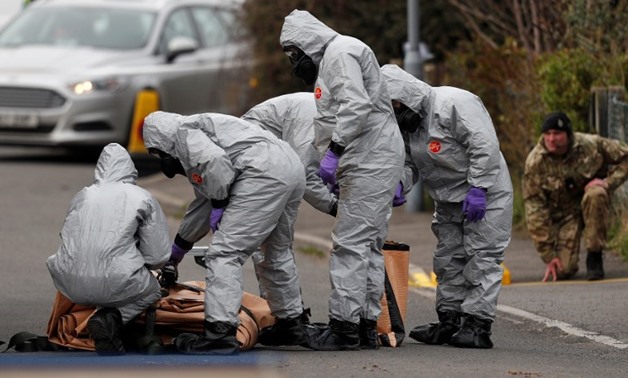
British Military personnel wearing protective coveralls work to remove a vehicle connected to the March 4 nerve agent attack in Salisbury, southeast England on March 14, 2018 – AFP/Adrian Dennis
CAIRO – 3 April 2018: The
came as a shock to the U.K. and world, as a former Russian double agent was targeted alongside his daughter with a Russian-made military-grade nerve agent. The story sounds as if it was taken directly from a Cold War thriller or an “Austin Powers” classic; however, it wasn’t the first time that Russia has been blamed with attempting to assassinate its dissidents on British soil. In 2006, former Russian spy and defector Alexander Litvinenko was killed when a radioactive substance – plutonium 210 – was put into his cup of tea in a London hotel.
While British Prime Minister Theresa May lacks the prowess of actor Mike Myers, she has led more than two dozen allies in a diplomatic offensive against Moscow. More than 150 suspected spooks were booked on board flights back to Mother Russia. While many states opted to expel one or two Russian officials, this token of support was necessary to register support for the U.K. and solidarity with its allies.
Granted diplomatic status by their host country, many of these so-called diplomats were nothing of the sort and were active Russian Federal Security Service (FSB) covert operatives seeking to meddle in foreign affairs and spy on matters of state interest. The biggest collective expulsion of Russian intelligence officials in history is likely to damage Russia’s overseas intelligence operations, but the extent of this damage is unknown. FSB-led intelligence-gathering networks outside of the diplomatic scope are likely to be more extensive and more effective, and they will continue to operate unimpeded.
of the attack was expected, as was the proposition that British agents were to blame. Conspiracy theories pointed to the Porton Down chemical weapons research establishment near Salisbury in Wiltshire, where the nerve agent was subsequently identified. It was unlikely this theory was to gain any traction in the U.K. or amongst its allies. The research facility was able to identify the nature of the nerve agent, its potency and its origin; all the evidence pointed towards Russian culpability. Putin has reacted in turn, casting away scores of foreign diplomats in Russia.
But, was the Kremlin aware that allowing the attempted murder of former double agent Sergei Skripal to take place in such a manner would provoke such a determined response? Likely, not. Putin’s attempt to pull Mother Russia back to the forefront of international diplomacy has seen the state regularly subvert the accepted international order, much to the disapproval of Western leaders. Although the memory of a politician is short-lived, Putin’s list of transgressions in recent years is expanding and politicians are more conscious of Russian attempts to interfere in the affairs of other states. Following the Kremlin’s successful attempts to meddle in the 2016 U.S. presidential election, Russian motives are far from concealed, leaving the U.K. and its allies with no choice but to act.
 Members of the fire brigade in green biohazard suits work near the bench where a Russian former double-agent and his daughter were found - AFP
Members of the fire brigade in green biohazard suits work near the bench where a Russian former double-agent and his daughter were found - AFP
The expulsions are less a strategic victory for the U.K. and its allies, and more impressive as a public, coordinated display of anger, proving that the bonds of solidarity have not been broken in this increasingly unpredictable world. Unleashing a nerve agent on to the streets of rural England is far from a divisive issue, and it dangerously oversteps the mark. For many world leaders, ignoring this issue would set a terrifying precedence and further embolden an already confident Putin, who has become accustomed to success. Yet, his attempts to sow discontent between Western allies have been overshadowed by the unified response that Theresa May has been able to rally behind the U.K.
Putin, aware that the image of solidarity in Europe is fractured, will be unimpressed with the unified response. Within the U.K., few political figures have questioned the notion of Russian guilt. While this may be expected from back-benchers, Jeremy Corbyn’s disapproval of the U.K.-led retaliation has done little to ease the relentless pressure from his party or mend rickety bridges. In contrast, May has been heralded for her strong and decisive leadership, something she has lacked during her time as prime minister thus far.
In contrast to the cohesion that May was able to form, Russia finds itself further detached and isolated from the world. Putin finds himself with few loyal allies around the world, which largely stems from his offensive stance towards neighboring states, severely limiting his opportunities to retaliate.
Russia may be in control of events in the Middle East and dictating the game of play in Syria, but Putin is unable to call upon Syrian President Bashar al-Assad, Turkish President Recep Tayyib Erdoğan or Iranian Supreme Leader Ayatollah Ali Khamenei to oppose the bloc put together by Theresa May. The rhetoric propounded by the Kremlin is not supported by either strong military alliances or extensive diplomatic clout. This contends with the notion that the world is moving closer to a second Cold War, since Russia is highly unlikely to be able to replicate the unity of the Warsaw Pact.
Is Russia simply standing alone defiantly, or is it a pariah state? Only time will tell. What is important to clarify is that Putin is increasingly finding himself without allies with diplomatic or military clout, yet remains confident enough to commit brazen chemical weapons attacks on foreign land; not just in the United Kingdom. The alliances and friendly relations Russia does have are founded on short-term interests and will not give Russia the political legitimacy to continue to act aggressively abroad without falling into the pariah state classification.


Comments
Leave a Comment